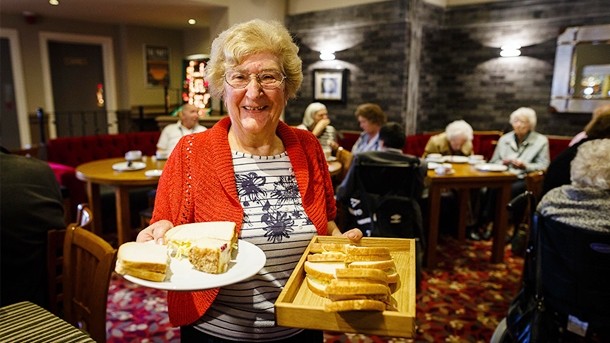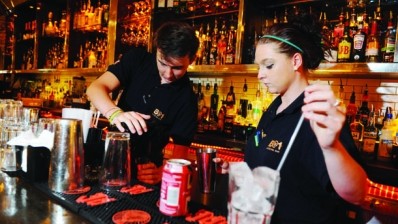Respect your elders: How to attract older customers to your pub

You see them of a Sunday lunchtime, sitting there, looking around them like they’ve never seen the inside of a pub before, and they wouldn’t be here now if wasn’t for their son or daughter, away at uni, who’s invited them down to show them a glimpse of their new life.
“It’s been so long since we’ve been in a pub,” they say, because, like so many, they got out of the habit while bringing up the family and having dinner parties.
The Association of Licensed Multiple Retailers’ (ALMR) CGA Future Shock report 2016 revealed that a third of over-55s had not visited a pub in the six months prior to the survey compared to 21% across the population as a whole.
Yet this age group now accounts for 36% of Britain’s population. It’s a market that’s growing and it has great potential for pubs which are, after all, ideally placed to offer reasonably priced food and drink in a relaxed, sociable atmosphere.
Significantly, 30% of over-55s are single and likely to be living alone, a figure that rises steeply past retirement. As successful community pubs have discovered, they can play an important role in providing society, conversation and a reason to get out of the house.
Though, as the ALMR says, “it’s a highly diverse audience. One senior size does not fit all” – and the key differentiator is money.
Active Baby Boomers
The £320bn that investment house ECI estimates is the value of the ‘grey pound’ in the UK is not shared equally.
So food-led pubs in wealthier areas can pin their strategy on attracting retired folk who have built up a nest-egg and are looking for different ways to spend it – the 9% who, according to the ALMR, eat out at least weekly.
Part of a Baby Boomer generation that is more active and adventurous than old people of the past, they are driving – literally, as they now have cars – a steady growth in spend on food and drink in pubs and restaurants by the over-50s.
Adapt to changing needs
Give them good food that’s worth a trip out, and they will come.
But there are those who are left behind. For all the talk about the older generation having it easy these days, the vast majority enter retirement on a tight budget.
A lot of pubs have tapped into this market by offering pensioners’ lunches at a special rate, maintaining margins by reducing portion sizes for those who may not have the appetites they once had.
When it comes down to it, though, it’s all about good customer service, recognising the different needs of the people who come through your door and giving them the right attention.
As we get older our needs change. We can still enjoy food, drink, company and hospitality, still be a part of life. We may not be so nimble, we may not hear nor see nor remember things so well, but a pub that picks up on this and does just a little to help can win loyal customers and new friends.
Case Study – The Firbank, Wythenshawe, Manchester
Simon and Rachael Delaney have run Admiral Taverns tenancy the Firbank Pub & Kitchen for 22 years and, in 2016, it was named Best Community Pub at the Great British Pub Awards and won a Pride of Manchester Award for its work with the local community.
As part of the Age Friendly Manchester initiative, the Firbank hosts a community lunch every Thursday, attracting older people with home-made sandwiches and cakes, plus as much tea and coffee as they can drink for £2.
It also encourages those living on their own to venture out for Sunday lunch with its Lone Star Dining scheme.
“It’s been a long journey for us and, of late, we’ve really recognised the importance of elderly customers, both in terms of what we can do to make their lives better, and what they can do for our business,” says Simon.
“They’re at the top of the family and they bring in their children, grandchildren and great-grandchildren. We’ve a chap who’s 86 or 87 who told his family he wanted to come here for his birthday as it’s his local.”
The Firbank gives something back too, by addressing problems of loneliness and poverty and joining other local businesses to launch Age Friendly Wythenshawe.
“We’re experimenting with a community shop and a cook-off, showing people on their own how they can make a good meal cheaply, because there is real food poverty around here.
“Loneliness massively exists,” he adds. “If they didn’t come here, the only thing they have is the TV. For some, the only time they get out of the house for some proper conversation is when they come to us.
“People read about the problems with community pubs, the stereotypes, but what we’ve created here is a place where all ages come together, a place where the younger people befriend the older people, and we’re upping the quality of life for them.”
Delaney is insistent that the Firbank doesn’t become like a community centre.
“We’ve kept the values and feel of a pub. Older people want social interaction, home-made pub grub like fish and chips, a proper cup of coffee and tea from a teapot in a proper cup. It’s got to feel right.
“Older people want the things other people want, they want normal standards. They don’t want to be put in a corner. They know what’s going on in the world and they want what’s on trend.”
Above all, the Firbank’s approach has won it appreciation and recognition in the wider community.
“People see what you’re doing and they want to support you, and it has a knock-on effect too, in the awards that we’ve won.”







